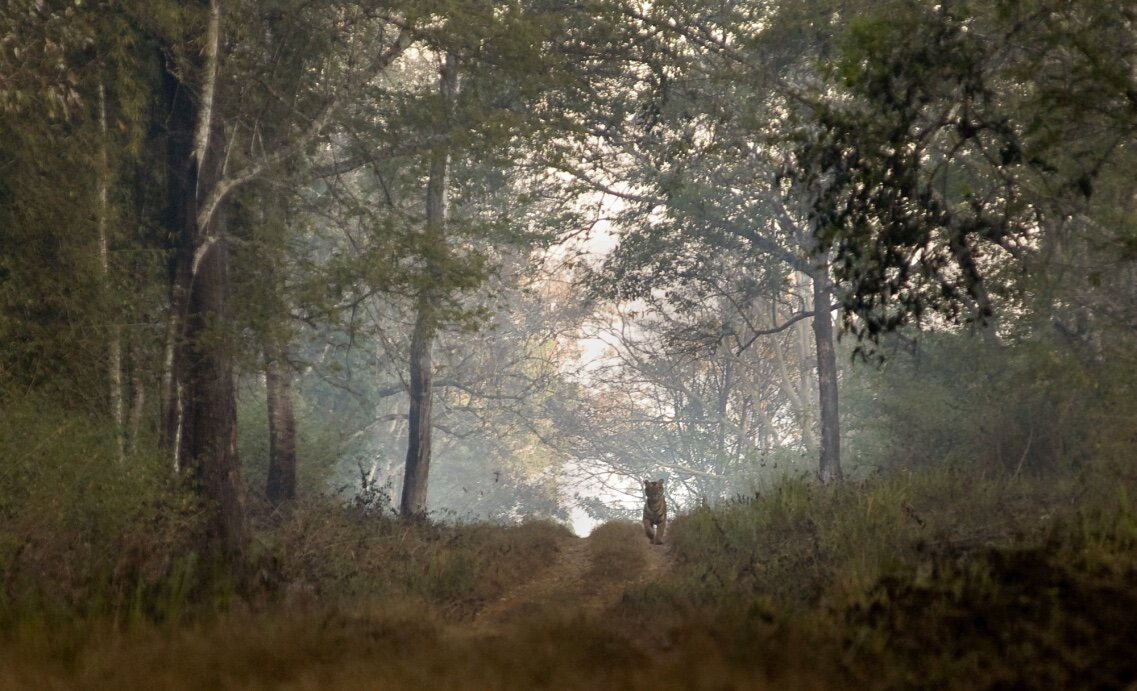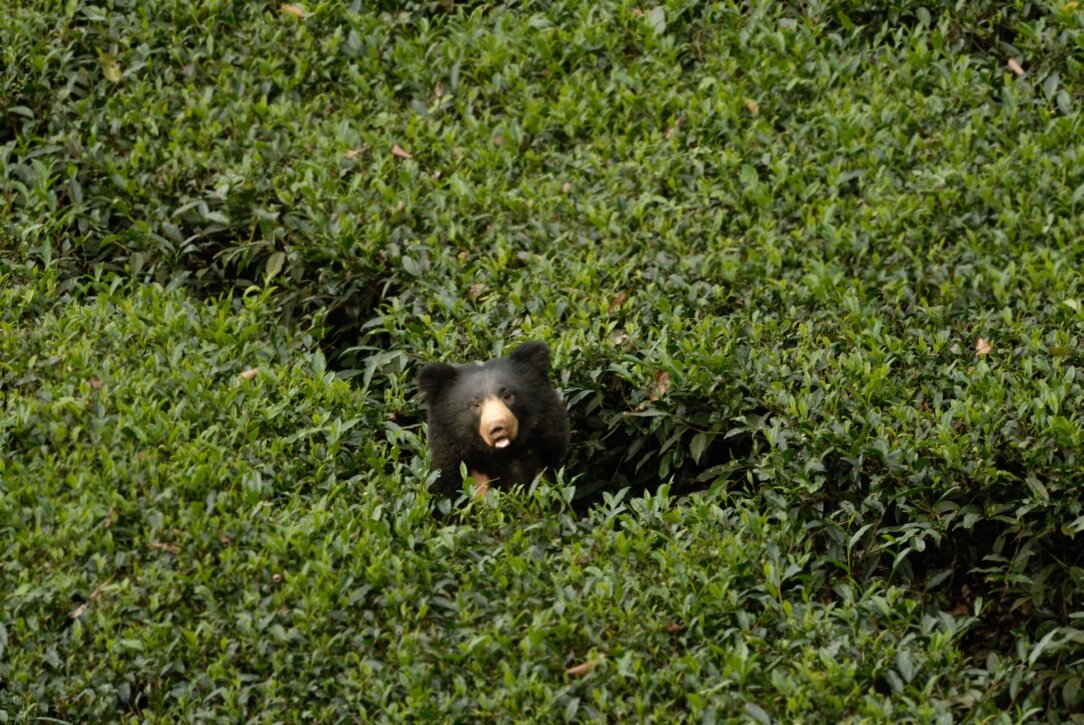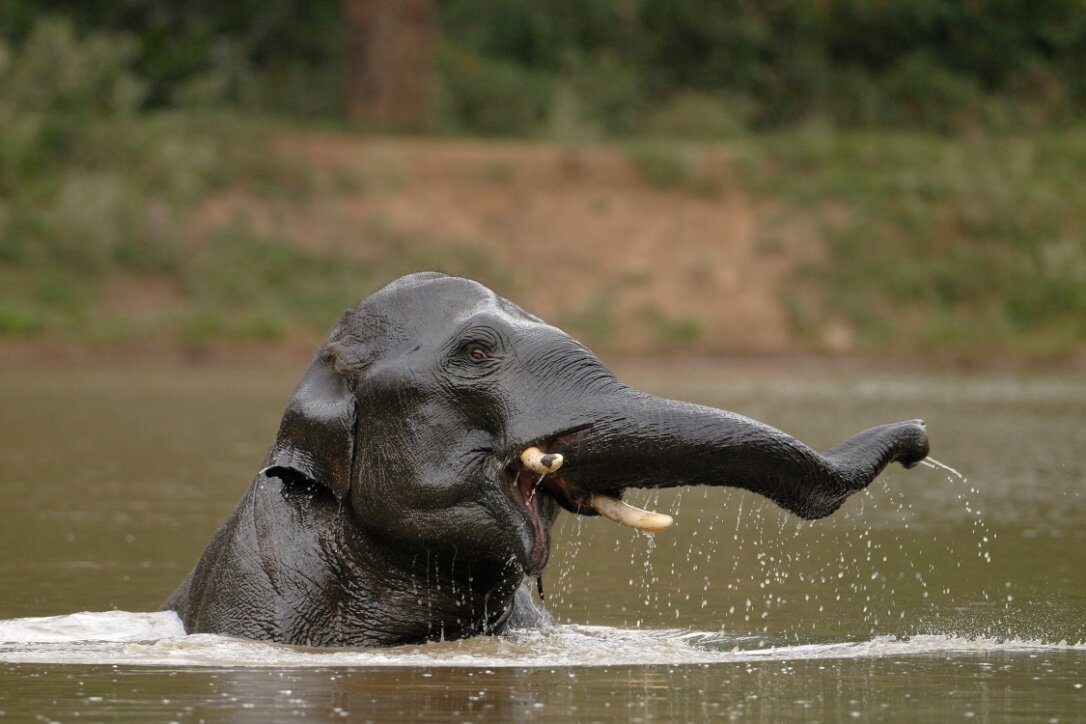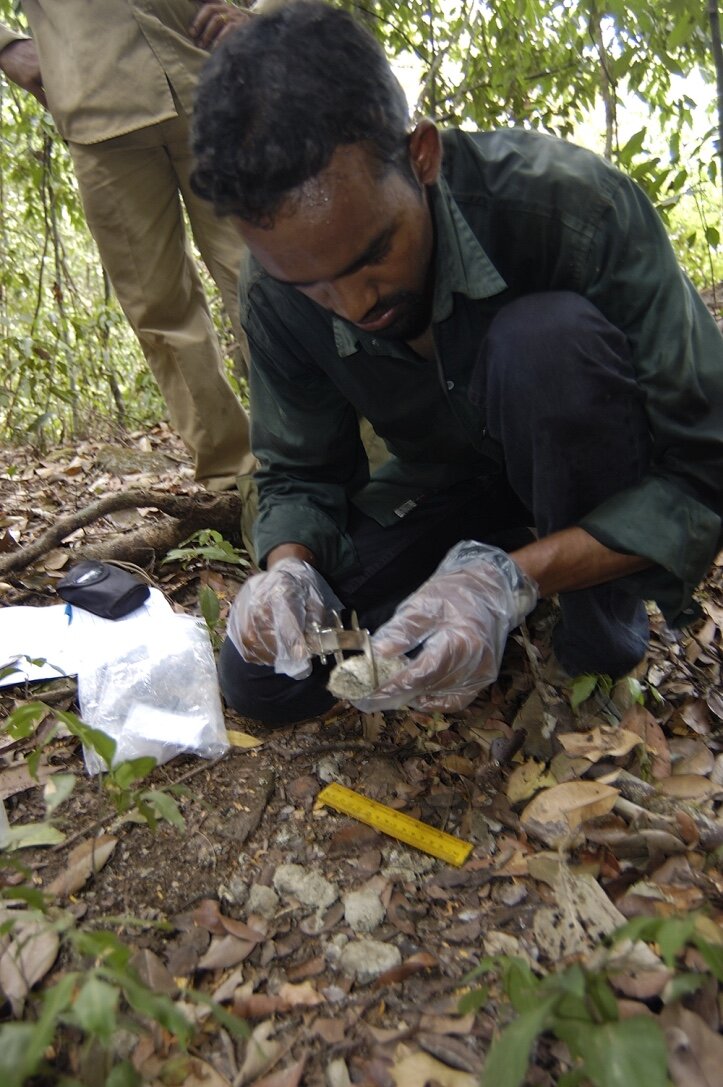
Current Initiatives
Our Projects
Three of the eight tiger subspecies that roamed Asia only 50 years ago are gone and the remaining population is under severe threats from habitat loss, hunting of its prey and poaching. Tiger's future is uncertain.
Our conservation activities are selected in consultations with world's tiger experts.
We raise money for the immediate needs of the wild tigers:
Protecting the tiger, its habitat, its prey and its protectors.
Supporting the surrounding villages (Community-based conservation), if appropriate.
Scientific studies to understand the needs of the tigers. Control of poaching and international trade of tiger parts.
Sacred Music for Sacred Forests Protecting the Wild Elephant Fundraiser
Oct 21, 2022
An intimate evening of sacred music to honor and conserve the sacred groves of wild India, home of the majestic tiger and elephants and a diversity of flora and fauna.
This gathering is a benefit in support of Dr. Krithi Karanth's conservation work in the remaining forests of India AND Rewilding India! Krithi is the daughter of Dr. Ullas Karanth is widely respected as India's preeminent tiger conservationist and biologist whom some of you met at our earlier in-person event in 2015.
This in-person evening, hosted by Saving Wild Tigers with support from Tibet House and Kirtan Wallah Foundation, raised $10K (Saving Wild Tigers made the donation to Center for Wildlife Studies CWS in November 2022). The donation will support farmers in India who face high wildlife conflict and enable them to switch from agriculture to agroforestry. This will create alternate livelihoods for farmers, buffer habitats for wildlife and sequester carbon.
Hanuman Chalisas with Nina Rao & Friends Benefit
Oct 29, 2022:
Nina Rao & Friends will offer Hanuman Chalisas as part of Krishna Das’s Peace of My Heart NYC Weekend urban retreat on Manhattan’s upper west side venue, the Church of St Paul and St Andrew for a weekend of chanting, stories and conversation with Krishna Das. This 2 hour event was offered by donation. 100% of the proceeds, a total of $2,450.00 will go toward saving wild elephants in India.
Benefit Concert Update
June 28, 2020
On May 30, 2020 in the midst of Covid-19, we premiered this video concert online and musical friends around the country contributed their expression of love for Nature.
Artists include Arjun, Mark Egan, Genevieve Walker, Noah Hoffeld, TrevorHall, MC Yogi, Wah!, Karnamrita Dasi, Benjy & Heather Wertheimer and of course Krishna Dasto raise funds for CWS India.
We raised $12K thanks to the support of viewers from around the world. All of what we raised went directly to Center for Wildlife Studies (CWS). Here is a note from Dr. Krithi Karanth, Chief Conservation Scientist at CWS.
June 28, 2020
Dear Nina and Sunil
Good to hear from you.
CWS Update: CWS went into a 45 day lockdown from March to April which was then slowly opened. With Wild Seve- we had to freeze the program for 5 weeks (fortunately it is low conflict season) but now we are back up and running- assisting people with conflict claims. Our field staff are taking all precautions while they come into contact with people. Initially all programs were on hold, but now Wild Seve is up and running as are the research and media teams.
Wild Shaale fortunately was able to exceed all our school commitments and wrap up the program by mid March. Some of our staff were able to get home while others got caught up in field bases and they all have finally gone home. The teams are working on updating the curriculum for the new year including an extension focused on wildlife disease transmission. We were planning to start the new cycle of schools in June- however all schools are currently closed and we will start only when the schools are operational.
I have spent the last 6 weeks looking at the mid to long term financial implications for CWS and these programs. Some of our Indian donors have pulled back because of COVID 19 impacts and are being pressured to fund the PM's fund. We are currently looking to find alternatives, be it other organisations or individuals. We have instituted pay cuts in CWS for everyone until we are able to secure new funding. Importantly, it has given me time to rethink and reimagine our work in the times of COVID.As an extension to our Wild Seve program, we are launching a new public safety program which will work with vulnerable communities living around multiple wildlife reserves across India. The program’s focus will be on preventing wildlife-related disease transmission to people and livestock, avoiding accidental encounters with wild animals, staying safe when encounters do occur, and providing access to emergency service providers and basic first-aid training. We will partner with community organisations and government departments to reach the most vulnerable people living with wildlife today.
Hope all well otherwise. Thank you both for all your help.
Krithi
Sacred Music for Sacred Forests Benefit
PROJECT UPDATE May 7, 2020:
We had to cancel our live concert scheduled in New York due to COVID shut down. Instead we offered a concert online see post above.
May 30, 2019:
For the second time, we will gather for an intimate evening of sacred music to honor and conserve the sacred groves of wild India, home of the majestic tiger will take place on May 30, 2020 in NYC. This special event includes Friends of Krishna Das including Nina Rao, Arjun Bruggeman, Mark Egan, Devadas, Janaki Kagel and other special guests opening the gathering with Krishna Das kirtan anchoring the event for a major part of the evening.
Sacred Music for Sacred Forests and Saving Wild Tigers with Krishna Das and Friends Fundraiser
May 19 2015
An intimate evening of sacred music to honor and conserve the sacred groves of wild India, home of the majestic tiger.
This benefit gathering hosted by Saving Wild Tigers, abc Carpet & Home and the Wildlife Conservation Society raised 16K+ in support of Dr. Ullas Karanth's conservation work in the remaining forests of India. Dr. Karanth, widely respected as India's preeminent tiger conservationist and biologist.
Project Lifeline Sunderban
2000 to 2007 West Bengal
This was one of our significant projects with high level of financial support. It focused on the Sunderban mangrove forests in West Bengal on the India-Bangladesh border. Among the project goals: providing financial relief for families of tiger attack victims, educational scholarships for the children of tiger attach victims, medical assistance for people injured by tigers, vaccination, primary healthcare and family planning for rural people who surround the tiger habitat. Human pressure on the tiger habitat is intense in this protected area and several deaths result annually due to human-wildlife conflicts. It is imperative for the tiger that its human neighbors maintain the goodwill towards it despite the dire poverty and competition for the resources. Hence our efforts for the community and for the tiger. We are proud of the fact that thanks to such community-based conservation efforts, the Sunderban tiger has been relatively unaffected by the recent horrible wave of poaching that has severely affected tiger reserves in the north.
Solar Lanterns for forest guards
2005 Madhya Pradesh, Central India
We provided solar-powered lanterns for each of the 57 patrolling camps in the Pench area. Virtually all these camps are without electricity and having the lighting is a significant increase in tiger protection in the area. [We thank Mr. and Mrs. Ketan Patwardhan of Chicago and their friends, co-workers and neighbors who made this project possible.]
Asian Elephant Conservation Manual
2003 Nagarahole-Bandipur Tiger Reserve, India
Development, production and distribution of a technical field manual targeted at researchers, conservationists, and wildlife managers for the scientific monitoring and management of Asian Elephants for South and Southeast Asia. This manual is similar to the successful tiger-prey monitoring manual published by the Wildlife Conservation Society in India in 2002. Since the tiger and the highly endangered Asian elephant survival is closely interlinked, this project is very much relevant for the tiger. Our level of support for this project was $10000 and we are thankful to the Wildlife Conservation Society for being the lead sponsor of the project and conducting an interactive workshop in Nagarahole-Bandipur Tiger Reserve, India, that brought together a group of experts to discuss and evaluate a variety of field and analytical techniques for monitoring elephant populations and other parameters relevant to elephant conservation. The manual was a result of this workshop.
Asiatic (Gir) Lion Study
2002
Research into the history and cultural context of the highly endangered Gir lion by Mr. Divyabhanusinh Chavda of Jaipur at a cost of $6000. This work has lead to the publication of a text by the Oxford University Press. The Gir lion is woven into the Indian culture and the survival of the lion in this isolated enclave is definitely not possible without understanding and nurturing the cultural link. The situation is not that different for the tiger, either.
Survey and Monitoring of Tiger Habitat
2001 Tadoba Tiger Reserve in Vidarbha, Central India
To create a database of the physical land features, water presence and the vegetation of the park. This effort was funded with the goal of creating the base for the following projects to improve the vegetation for the herbivores animals, water management, and tiger conservation research on the basis of this information collected. The project cost was $4000. We thank the Wildlife Conservation Society for overseeing this project.
Habitat Survey and Community Conservation
2001 North Karnataka., India
This $4000 project in the Anshi National Park and Dandeli Wildlife Sanctuary situated on the northwestern side of the Uttara Kannada District, covered a contiguous area of about 1084 sq. kilometers of prime Tropical Moist Evergreen Forest tiger habitat. Logging, commercial extractions of Non-Timber Forest Products, destruction of forests for developmental projects and hunting of tiger's prey are the major threats in this region. This project addressed the conservation needs of this important tiger habitat and seeded conservation programs and awareness efforts. We thank the Wildlife Conservation Society again for overseeing this project.
Water Harvesting Structure
2001 Sariska Reserve in Rajasthan, Northwest India
This innovative structure is one of a series of such structures constructed by the Tarun Bharat Sangh for the purposes of erosion prevention and reforestation. Generally used in human communities, this particular structure is essential for the parched wildlife during the very dry summer months of Rajasthan. Project cost was $4300 for one structure. Tarun Bharat Sangh was subsequently awarded he 2001 Magsaysay award for community leadership.
Boy Scout Cub Den 14 makes a difference for the tiger cubs
First graders from Den 14 of the Tiger Cub Scouts in Montgomery, New Jersey, wrote a letter to President Clinton urging him to save the wild tigers. They also donated a box of socks and ponchos to Saving Wild Tigers for the forest guards who protect the tigers in India. The raincoats were taken to the Phen Sanctuary in Madhya Pradesh and were handed over to Mr Parihar, the DFO (District Forest Officer) in that region. Project cost nil.
1999 -2000
Forest guard clothing
Summer 2000
Donated by Patagonia Inc's Washington DC store, was taken to the Hemis National Park, Ladakh. The warm clothes were handed over to Riinchen Wangchuck who works with the snow leopard stewardship program along with the Snow Leopard trust. This was Patagonia's 2nd donation for the wild cats. (See below for a description of Ladakh's extreme climate). A few Patagonia jackets also went to the forest Department in Sariska tiger reserve in Rajasthan, Northwest India, where we sponsored a water conservation project.
Forest Guard Equipment Grant
Winter 1999
$1,200 for the emergency procurement of equipment (boots, socks, sweaters and raincoats) for approximately 200 staff of Tadoba-Andhari Tiger Reserve in Maharashtra, Central India.
Elephant-Mahout Award
Summer 1999
$500 awarded to elephant-mahouts (drivers) in Kanha National Park for patrol work.
Tiger Link Forest Guard Awards
Fall 1999
$125 each were awarded to Mahendra Singh "for his exemplary courage in nabbing poachers, in spite of putting his life at risk. He has shown particular ability in collecting valuable information on anti-poaching activities. His hard work in June 1999 in capturing one injured tiger at Bodal is also worthy of mention." and to Balbir Singh, who "as a forest guard working as a driver, has been associated with teams working to nab poachers. He also showed remarkable courage in capturing a sick tiger and rescuing it. He was the first person to approach the animal... has worked hard in controlling illegal grazing..."
Forest Guard Equipment
Spring 1999
For staff patrolling the snow leopard range in Ladakh via Dr. Raghu Chundawat. Total equipment value of $1,500 was donated from Patagonia, Inc. in Washington D.C. This area is significant for the tiger as well since it is through Ladakh that tiger bones are smuggled across to Tibet and are bartered for shahtoosh (the illegal fur of the endangered Tibetan antelope). The conditions are extreme with high altitudes at 14,000 feet and temperatures that drop below -35 Centigrade. Since a small staff covers a large area mostly on foot, good winter gear was welcome.

“The greatest danger to our future is apathy”
— Jane Goodall













